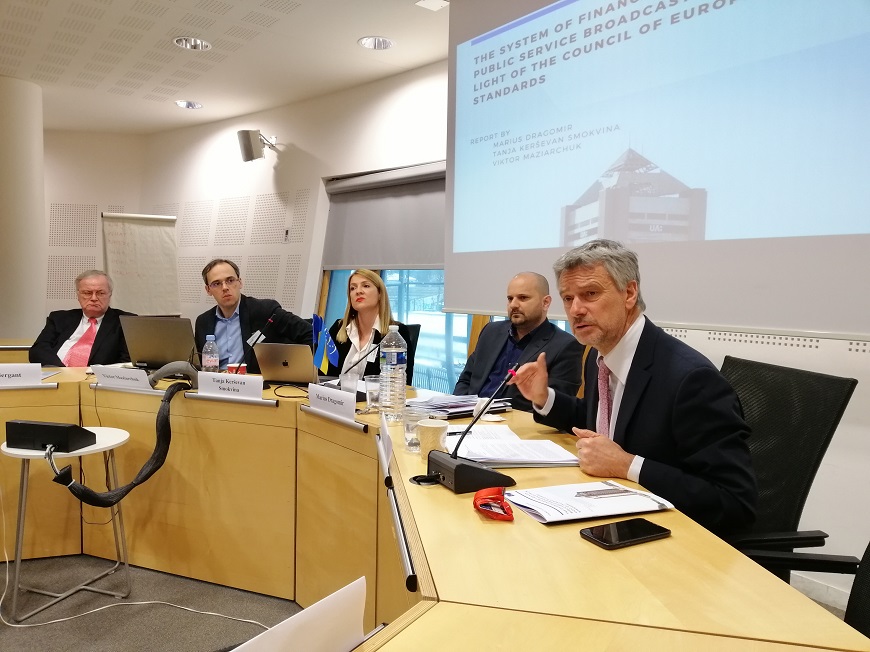The presentation of the Council of Europe expert report “The system of financing Ukrainian Public Service Broadcaster in light of the Council of Europe standards” was held in Strasbourg on 24 January 2019. This document was prepared at the request of the Parliamentary Committee on Freedom of Speech and Information Policy of Ukraine by Council of Europe consultants Marius Dragomir (Hungary), Tanja Kerševan Smokvina (Slovenia) and Victor Maziarchuk (Ukraine).
The experts’ analysis revealed that there are two viable scenarios of financing the public broadcaster in current situation in Ukraine:
“The starting point of any scenario is that the funding should be sufficient for UA:PBC to carry out its public service mission and that predictability and transparency of this funding should be guaranteed. The funding should not be used as a means of pressure, reward or subordination. There should be reliable, transparent, impactful guarantees behind any forms of financing. Counterbalances should be created to prevent interference both in the process of planning and approval of the amount of allocated funding”.

The first scenario (Scenario A) builds on a model advocated by the Supervisory Board of the
UA:PBC. In order to secure stable and sufficient financing of the UA:PBC from the Special Fund of the State Budget, fed by the rental fee for the use of the radio frequencies, the following safeguards are needed:
-
Not limiting the funding by linking it to a percentage of the total revenue from frequency rent;
Giving absolute priority to the UA:PBC funding by banning reallocation of the funds for it in the Special Fund to other purposes before UA:PBC funding needs are met.
By introducing the Special Fund (consisting of revenues from fees for use of frequency) as a new form of state budget contribution, this model is preferable because it diversifies sources of funding
(although they come from the same resource), significantly diluting the leverage of authorities on
cutting the state allocation every year.
Scenario B is based on the improved version of the current funding model, according to which
UA:PBC is financed from the General State Budget Fund. The current legislation guarantees a separate budget line for financing the UA:PBC in the budget. However, Article 14 of the PSB Law has
not been given full effect and the amount of expenditures for UA:PBC is determined by the
Government based on the available state budget funds.
However, in opinion of the experts, this model is hard to implement in reality: experience has so far showed that this model has been from the onset abused for political gains. With changes to legislation, it could provide the stable and predictable funding that UA:PBC needs for its ongoing development. Nevertheless, this model would be effective only if political practices and culture would change and it is absolutely clear that this cannot happen instantly.
Therefore according to the authors of the report the choice should be given to one of two proposed scenarios.
Patrick Penninckx, Head of the Information Department of the Council of Europe opened and moderated the event.
The presentation was attended by following participants from Ukraine:
-
Тetyana Lebedeva, Head of the Supervisory Board of UA:PBC;
-
Vadym Miskyi, Secretary of the Supervisory Board of UA:PBC;
-
Inna Grebeniuk, Member of the Management Board of UA:PBC;
-
Rodion Nykonenko, Member of the Management Board of UA:PBC;
-
Grygoriy Shverk, member of the Parliamentary Committee of Freedom of Speech and Information Policy;
-
Yuriy Dzhygyr, Deputy Minister of Finance of Ukraine;
-
Victor Maziarchuk, Council of Europe consultant (Ukraine);
Galyna Smirnova, Senior Project Officer, Council of Europe Project “Strengthening freedom of media, access to information and reinforcing public broadcasting system in Ukraine”.
Dmytro Kuleba, Ambassador, Permanent Representative of Ukraine to the Council of Europe; Pavlo Pushkar, Head of Division of the Department for the Execution of Judgments of the European Court of Human Rights, Directorate General for Human Rights and Rule of Law; Shahin Abbasov, Project Manager, Council of Europe Project “Strengthening freedom of media, access to information and reinforcing public broadcasting system in Ukraine”; Radka Betcheva, Boris Bergant and Giacomo Mazzone, representatives of the European Broadcasting Union; Oksana Pasheniuk, Senior Political Advisor to the Special Advisor of the Council of Europe Secretary General on Ukraine; Olena Pitsun, Administrator of the Office of Council of Europe Commissioner for Human Rights; Serhii Kiral, member of the Ukrainian Delegation to the PACE and others also participated in the presentation.
The report can be downloaded in Ukrainian and English
.







